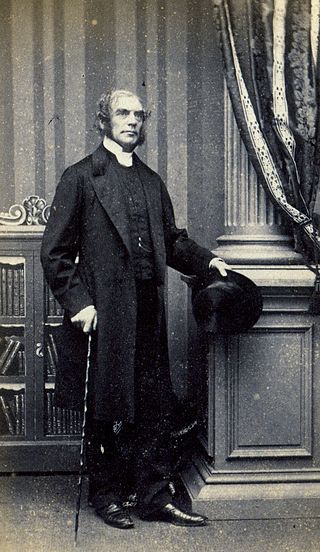Fictional
- Eddie Winslow, a character on the television series Family Matters
Edward Winslow was an American Pilgrim leader on the Mayflower.
Edward Winslow may also refer to:

Events from the year 1783 in Canada.

Events from the year 1784 in Canada.

Events from the year 1785 in Canada.

Events from the year 1788 in Canada.

Edward Winslow was a Separatist and New England political leader who traveled on the Mayflower in 1620. He was one of several senior leaders on the ship and also later at Plymouth Colony. Both Edward Winslow and his brother, Gilbert Winslow signed the Mayflower Compact. In Plymouth he served in a number of governmental positions such as assistant governor, three times was governor and also was the colony's agent in London. In early 1621 he had been one of several key leaders on whom Governor Bradford depended after the death of John Carver. He was the author of several important pamphlets, including Good Newes from New England and co-wrote with William Bradford the historic Mourt's Relation, which ends with an account of the First Thanksgiving and the abundance of the New World. In 1655 he died of fever while on an English naval expedition in the Caribbean against the Spanish.

Loyalists were colonists in the Thirteen Colonies who remained loyal to the British Crown during the American Revolutionary War, often referred to as Tories, Royalists or King's Men at the time. They were opposed by the Patriots, who supported the revolution, and called them "persons inimical to the liberties of America."

Edmund Fanning was an American-born colonial administrator and military officer. Born in New York, he became a lawyer and politician in North Carolina in the 1760s. He first came to fame as the focus of hatred of the Regulators, and led anti-Regulator militia in the War of the Regulation. When the American Revolutionary War broke out, he was driven from his home in New York, and joined the British Army, recruiting other Loyalists. He served during campaigns in New England and the South. At the end of the war in 1783 he became a United Empire Loyalist, settling in Nova Scotia.

St. Paul's Church is an evangelical Anglican church in downtown Halifax, Nova Scotia, within the Diocese of Nova Scotia and Prince Edward Island of the Anglican Church of Canada. It is located at the south end of the Grand Parade, an open square in downtown Halifax with Halifax City Hall at the northern end.

The Old Burying Ground is a historic cemetery in Halifax, Nova Scotia, Canada. It is located at the intersection of Barrington Street and Spring Garden Road in Downtown Halifax.
Edward Winslow was a loyalist officer and New Brunswick judge and official.

The Isaac Winslow House, also known as the Winslow House Museum, is a mansion located in Marshfield, Massachusetts built around 1700. The house is listed on the National Register of Historic Places.

The Mayflower House Museum is an 18th-century period historic house museum in Plymouth, Massachusetts operated by The Mayflower Society, also known as the General Society of Mayflower Descendants. The Society purchased the Edward Winslow House in 1941.

Lyttelton Stewart Forbes Winslow MRCP was a British psychiatrist famous for his involvement in the Jack the Ripper and Georgina Weldon cases during the late Victorian era.

Octavius Winslow, also known as "The Pilgrim's Companion", was a prominent 19th-century evangelical preacher in England and America. A Baptist minister for most of his life and contemporary of Charles Spurgeon and J. C. Ryle, he seceded to the Anglican church in his last decade.
Winslow is an English surname. Notable people with the surname include:

Bradlee, Winslow & Wetherell (1872–1888) was an architecture firm in Boston, Massachusetts. Its principals were Nathaniel Jeremiah Bradlee (1829–1888), Walter Thacher Winslow (1843–1909) and George Homans Wetherell (1854–1930). Most of the firm's work was local to Boston and New England, with a few commissions as far afield as Seattle and Kansas City.

Anna Green Winslow, was an American letter writer. A member of the prominent Winslow family of Boston, Massachusetts, United States, she wrote a series of letters to her mother between 1771 and 1773 that portray the daily life of the gentry in Boston at the first stirrings of the American Revolution. She made copies of the letters into an eight-by-six-and-a-half-inch book in order to improve her penmanship, making the accounts a sort of diary as well. This diary, edited by 19th-century American historian and author Alice Morse Earle, was published in 1894 under the title Diary of Anna Green Winslow, A Boston School Girl of 1771, and has never gone out of print. It provides a rare window into the life of an affluent teenage girl in colonial Boston.

The King's Orange Rangers, also known as the Corps of King's Orange Rangers, were a British Loyalist battalion, raised in 1776 to defend British interests in Orange County, Province of New York and generally in and around the New York colony, although they saw most of their service in the Province of Nova Scotia. The battalion's commander was Lieutenant Colonel John Bayard. The Rangers had an undistinguished military record, through most of its existence, and saw very limited combat, mostly against Patriot privateers, but did play an important role in the defence of the colony of Nova Scotia in the later years of the American Revolution. The King's Orange Rangers are especially remembered for their role in the defence of Liverpool, in the Nova Scotia colony.

Edward Winslow was a loyalist who was a government official in Boston until he moved to Halifax, Nova Scotia in 1776 during the American Revolution. He was the great grandson of Mayflower Pilgrim Edward Winslow. During Father Rale's War, Winslows older brother Josiah was given the command of Fort St. George and was killed by natives of the Wabanaki Confederacy in the Northeast Coast Campaign (1724). He was also the father of loyalist Edward Winslow.